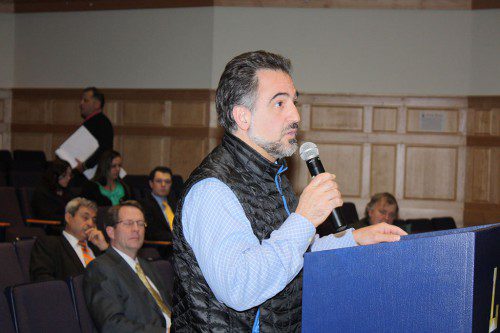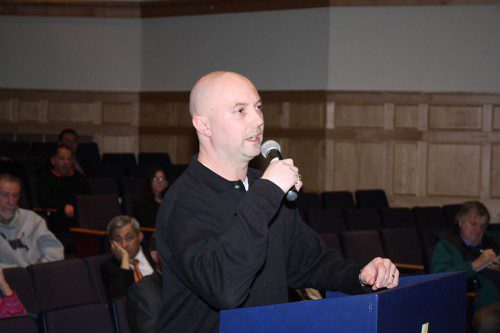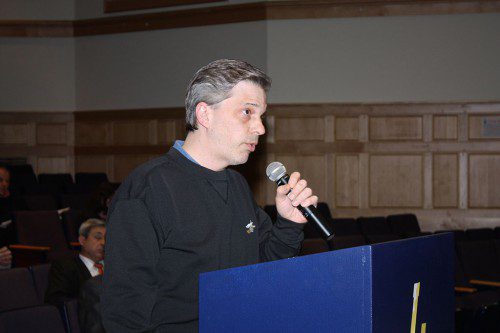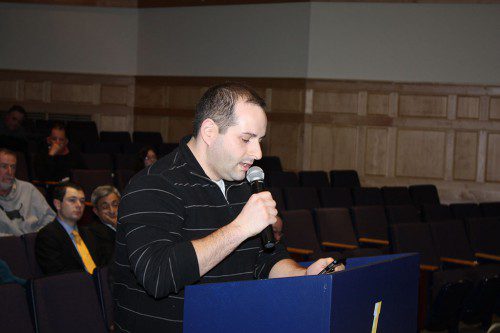Published in the April 13, 2016 edition
By MAUREEN DOHERTY
LYNNFIELD — The message delivered to the panel of state DPU officials was clear and unilateral. Respect the private property rights of landowners by not granting permission to Kinder Morgan and Tennessee Gas Pipeline to conduct land surveys on property whose owners have denied the company access to their land.
Several hundred people from Lynnfield and surrounding communities attended the public hearing last Wednesday night held at LMS and 26 people testified, from ordinary citizens and direct abutters to elected officials.
Attendees raised concerns ranging from the impact the pipeline survey, and ultimately, the construction of the pipeline if granted by FERC, would have on residents both personally and as part of the broader community. These concerns included loss of the use, enjoyment and value of their homes; concern over their personal safety from potential explosions and leaks amplified by the fact the pipeline passes by an active blasting quarry in Peabody; and concern over potential loss or contamination of public drinking water supplies served by watersheds such as the Ipswich River from both the pipeline and the herbicides used to keep easements permanently clear of all vegetation.
The issue of a state-imposed tariff on natural gas ratepayers to pay for the pipeline’s infrastructure was also raised by Peabody City Councillor Barry Sinewitz. “I want to make sure it’s not true that the state, the governor and the legislature is considering a tariff, a tax, put on residents’ utility bills to pay for the infrastructure of the pipeline. I pray to God that’s not true. To build it on the back of the taxpayers would be outrageous. Any reps that are here, I want to hear it from them saying, ‘No, I will not support a tariff on this,’” Sinewitz said.
The audience fell silent as North Hill Drive resident AJ Qualtieri spoke of the fears he has for his unborn son. “The thought of my future children running through a backyard with a 1600 psi, 24-inch natural gas pipeline only feet away smack dab on top of the incineration zone is both frustrating and sad,” Qualtieri said.
“I am not only a concerned citizen, but the pipeline goes directly through my backyard,” Qualtieri said, explaining that when he and his wife purchased their home 15 months ago they were “completely unaware of the plans of Kinder Morgan at the time.” Kinder Morgan’s plans; however, were in full swing at that time but had not been revealed.
Qualiteri’s neighbor, Roy Pincus, was also unaware of Kinder Morgan’s plans when he and his wife purchased their home. “My wife and my three boys and I moved into our home less than 18 months ago without any knowledge of this monstrosity that is slated to come right through our front yard. When I went with my fellow neighbors to a Kinder Morgan dog and pony show, the only thing that I took out of there was at least they were honest with me by telling me I would literally be fenced off from my own yard,” Pincus said.
“When I moved into my home, the one thing I looked forward to more than anything was playing ball with my three boys in my yard, which I do every day,” Pincus added. “To be told literally that would be taken away from me was beyond a low blow. This company is beyond deceitful…This is a company that is over $47 billion in debt with barely enough cash to build this project. In order to keep some cash reserve they had to slash their dividend they pay to their shareholders significantly in order to keep their shareholders from going further down the wrong side of their investments.”
Both men pleaded with the DPU officials not to make a decision that would help facilitate the building of this pipeline and their sentiments were echoed by every other speaker throughout the night.
Last Wednesday’s hearing was one of six such hearings held statewide. The last hearing will be held Thursday, April 14 at Andover High School at 7 p.m. Hearing officer Stephen August, an attorney with the Siting Division of the DPU, chaired the meeting and allowed five minutes for each person to speak. He reminded those in attendance that written testimony would be given equal weight to oral testimony during the DPU’s deliberations.
Comments accepted until May 6
Written testimony must be submitted to August’s attention by Friday, May 6 referencing file numbers “Tennessee Gas Pipeline Company, D.P.U. 16-01/16-02/16-03.” Comments submitted via email should be sent to both Hearing Officer Stephen August at: Stephen.August@state.ma.us and to the DPU at: dpu.efiling@state.ma.us. If submitting testimony via regular mail, three copies are required and must be addressed to: Department of Public Utilities, Siting Division, 1 South Station, Boston MA 02110, Attn: Stephen August, Hearing Officer.
Three other DPU panelists listening to the testimony were Angela O’Connor, chairman of the DPU; Andy Green, the division director of the Siting Division; and Dhruv Bhatnagar, an engineer with the DPU’s electric power division.
Engineer, not economist
At the outset of the hearing, August incorrectly identified Bhatnagar as an “economist” with the DPU, which led many speakers to question why the DPU would need an economist on its panel if this matter was not just about big money from corporate interests over the rights of ordinary property owners. The oversight was not revealed until the meeting had adjourned.
Sinewitz said the pipeline will go through the heart of his district, Ward 6, including the public drinking water supply, which affects multiple communities. “They’re going to clear cut 25 feet on either side of the (pipeline) has to be kept clean of all brush. They’re going to use herbicides,” he said. Another public safety concerns is the easement needed from “an active blasting quarry that sits right next to the pipe,” he said.
“The reason we’re here tonight is over 400 homeowners across the state have refused Kinder Morgan access to their properties for the surveying of the pipeline. Kinder Morgan is appealing that. They want to be able to go onto these homeowners’ sites, so I am saying tonight to the DPU: Please respect the rights of these property owners and deny Kinder Morgan access to their properties.”
Peabody Mayor Ted Bettencourt said he tries to take a “balanced approach” when reviewing projects such as this, including, “the affordability of energy,” and the “rights of business to operate,” as well as protecting the rights of all property owners. He told the DPU all the research he has done indicates this pipeline would have no economic benefit to the region. “This is going to be connecting to a lateral that is eventually going to Nova Scotia for export,” Bettencourt said.
Potential contamination of the Ipswich River Watershed is a “major concern,” Bettencourt said. “Peabody is one of 20-plus communities that gets their drinking water in large part from the Ipswich River. … There is no more important thing that we do than to make sure we have quality water for our residents,” Bettencourt said.
State Rep. Brad Jones, who represents Lynnfield, North Reading and Middleton in this matter, said he agreed with the comments made by the other elected officials. “I reiterate my opposition to the pipeline. I urge the DPU to deny the survey petitions,” Jones said, adding he would offer more extensive written testimony to allow more time for the residents to tell their stories.
“You will hear some very interesting stories about distrust and mistrust that Kinder Morgan has perpetrated on the citizens of the North Shore and across the commonwealth in the previous months and years,” Jones said.
Representing the Lynnfield Board of Selectmen, Tom Terranova said the town is “aggressively against” the pipeline. Noting that the town only found out about Kinder Morgan’s plans last fall, Terranova said, “Members of our community are appalled to find out that some in this audience purchased a home without knowing that they could potentially have an enormous gas main coming through their property. That is appalling. Kinder Morgan has known about and has not passed this information along.” Such oversights must be considered when evaluating how a public utility deals with the public, he said.
“If it was you and that was your house and you just purchased a home for $1 million or $800,000, how would you like a three-foot gas main going through your front yard or your backyard?” Terranova asked the panel. He said the town is also concerned the real purpose of the pipeline has not been revealed. Although the company says more gas is needed to generate electricity locally, Terranova said there are “other sources” available and cited the Attorney General’s report that the natural gas that would be generated by this pipeline would not be needed here.
Terranova also expressed concern over the surveying of the town’s conservation lands and wetlands due to the damage that will result from the surveying process. The fact that the pipeline will run through the town’s drinking water supply is a huge concern. “We have several wells and potential wells that would be in the same proximity to this pipeline,” Terranova said, asking the panelists what would the town do if an explosion or the use of chemicals tainted or destroyed its water supply.
Noting the land over the pipeline must be kept clear of vegetation for 50 feet (25 feet on either side of the pipe), Terranova asked, “What do we do when it is within 50 feet of someone’s house? Destroy their property? They won’t have trees? They won’t have grass? What are their alternatives? Sell their house for a substantial loss and move?”
KM fires staff
Selectmen Chairman Phil Crawford told the panel he learned on the day of the hearing that Kinder Morgan had fired its Boston staff of engineers and land surveyors and closed its office downtown, which indicates to him that Kinder Morgan is not working on this project. He added that the company’s original claims that there was a “huge demand in New England” for this natural gas were false.
“They do not have enough end-users to move forward on this, so before you even consider moving forward on their application for surveying anybody’s land, take a strong look at whether this is even needed or whether they really have the intention of moving forward with it themselves,” Crawford said.
Pincus, of 25 North Hill Drive, said instead of taking on another $5 billion-plus project, Kinder Morgan should worry about maintaining its current infrastructure. “Because when you take on more than you can chew, you end up cutting corners, and when you cut corners, you put people’s lives at risk,” he said, which generated a round of applause.
“We are the ones who have to live with this every day. Kinder Morgan could give a darn about us. They’re here for their back pockets and their back pockets only and we are just pawns in their chess game,” Pincus said.
“I urge you to do the right thing, listen to the people in this room, and do not do anything to facilitate the building of this pipeline and oppose it strongly, and stand with the people in the commonwealth,” Pincus said.
DOE: Profits a public benefit
Leigh Youngblood, who traveled from Warwick, Mass., a town affected by the pipeline, addressed another speaker’s concern about whether this project offers a public benefit, Youngblood cited a recent decision of the federal Dept. of Energy regarding Pieridae LNG, which she said is relevant because discusses an analysis of the export of natural gas.
The DOE order issued in February affects natural gas sourced in the U.S. that is exported to Canada where it is liquefied and then re-exported to countries that do not have free trade agreements with the U.S. It is considered a landmark decision because it puts Canadian export terminals on par with those in the U.S.
“They did 12 different analyses about what (exporting the gas) would have on the cost of gas and in all 12 … the price of gas went up,” Youngblood said.
In spite of this fact, Youngblood said the DOE “decided that it was still in the public interest because the price goes up, the gas companies make more money and that increases the gross domestic product of the United States. So because the rich are getting richer, that is a public benefit,” she said, adding, “This is the type of logic that is being used against property rights and I think it’s wrong.”
Robert Douglas of 20 Longbow Circle told the panel that he was “disturbed” and “concerned” over the pipeline. “I have been an environmental engineering consultant for 30 years working with companies like CleanHarbors and Gale Associates and other environmental companies so I know about environmental impact of a project like this,” Douglas said. “One of my main concerns as a resident of Lynnfield is the pipeline’s path directly through our watershed. The Lynnfield watershed currently serves three communities on the North Shore and 14 other communities in Massachusetts. The pipeline will cut that watershed in half with a 50-foot swath cut through it.”
While they were told by Kinder Morgan officials that this vegetation would be controlled using “mechanical means, not herbicides,” his research indicates that lawn tractors will not be allowed through the wetlands.
“They are going to be putting Roundup in the drinking water of our communities, which causes cancer. Kinder Morgan is all about the money. This is not about money. This is about people, citizens and the safety of our community,” Douglas said.
Additionally, Douglas said the pipeline is heading to Danvers, where it will connect to the Maritimes and Northeast pipeline to Nova Scotia. “What was not mentioned was there are already permits in place to reverse the direction of the flow of the Maritime pipeline so instead of bringing gas into Massachusetts, it is now transferring the gas outside Massachusetts from this pipeline to Canada – Nova Scotia – where it will be exported to Europe. This is not for public use. This gas is for corporate profit,” Douglas said.








